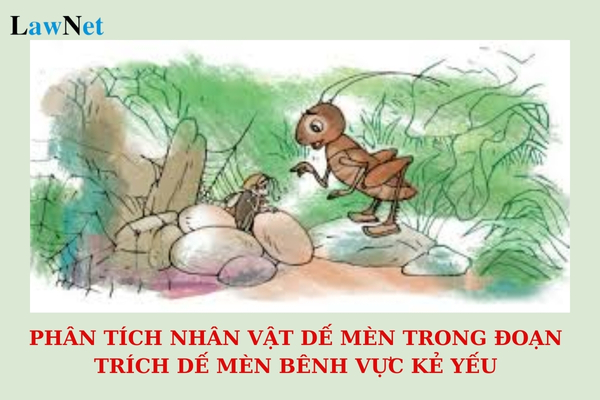What are sample paragraphs on analyzing the character of Dế Mèn in the excerpt "Dế Mèn bênh vực kẻ yếu" for grade 4 students in Vietnam?
What are sample paragraphs on analyzing the character of Dế Mèn in the excerpt "Dế Mèn bênh vực kẻ yếu" for grade 4 students in Vietnam?
"Dế Mèn bênh vực kẻ yếu" is an excerpt from the work "Dế Mèn phiêu lưu ký" by the author To Hoai and is taught in the Grade 4 Vietnamese language education program.
Students can refer to some sample paragraphs analyzing the character of Dế Mèn in the excerpt "Dế Mèn bênh vực kẻ yếu" below:
|
Sample paragraphs on analyzing the character of Dế Mèn in the excerpt "Dế Mèn bênh vực kẻ yếu" Sample 1: Trong đoạn trích “Dế Mèn bênh vực kẻ yếu”, Dế Mèn là một nhân vật dũng cảm và nghĩa hiệp. Khi nhìn thấy chị Nhà Trò nhỏ bé và yếu đuối đang ngồi khóc, Dế Mèn không bỏ qua mà dừng lại để hỏi han và an ủi chị. Dế Mèn lắng nghe câu chuyện buồn của chị Nhà Trò, biết chị đang bị bọn nhện hăm dọa và đánh đập vì không trả được nợ. Lúc này, Dế Mèn rất thương cảm, đồng thời cũng tức giận khi thấy kẻ mạnh bắt nạt kẻ yếu. Cậu nói: “Đứa độc ác không thể cậy khỏe ăn hiếp kẻ yếu”, thể hiện rõ ràng suy nghĩ và quyết tâm của mình. Dế Mèn muốn bảo vệ chị Nhà Trò và không để bọn nhện bắt nạt chị. Nhờ vậy, cậu đã khiến chị Nhà Trò cảm thấy an tâm hơn. Qua hành động này, Dế Mèn hiện lên với lòng yêu thương và sẵn sàng đứng lên bênh vực những ai yếu đuối, không để cái ác tiếp tục lộng hành. Sample 2: Trong đoạn trích "Dế Mèn bênh vực kẻ yếu", Dế Mèn không chỉ thể hiện lòng dũng cảm mà còn cho thấy tấm lòng nhân hậu, sự trưởng thành và ý thức trách nhiệm của mình. Khi thấy chị Nhà Trò yếu đuối, bất lực trước sự đe dọa của bọn nhện, Dế Mèn không hề do dự mà lập tức đến gần, an ủi, lắng nghe câu chuyện của chị. Lòng trắc ẩn trong Dế Mèn thể hiện ở sự thấu hiểu sâu sắc hoàn cảnh bất hạnh của chị Nhà Trò: mẹ mất, thân mình yếu ớt và cuộc sống luôn bị đe dọa bởi những kẻ mạnh. Nhờ lòng nhân hậu ấy, Dế Mèn sẵn sàng hành động vì lẽ phải, quyết tâm bảo vệ chị Nhà Trò khỏi nguy hiểm. Qua việc mạnh mẽ đứng lên bênh vực kẻ yếu, Dế Mèn đã thể hiện sự trưởng thành trong cách nhìn nhận về cuộc sống và xã hội. Hành động dắt chị Nhà Trò vượt qua nơi nguy hiểm của Dế Mèn còn chứng tỏ ý thức trách nhiệm và khát khao xây dựng một cộng đồng công bằng, không có sự áp bức. Dế Mèn là hình ảnh đẹp của tinh thần dũng cảm, bao dung, dám đấu tranh vì công lý, để lại bài học sâu sắc về lòng nhân ái và sự trưởng thành trong mỗi con người. |
Note*: The sample paragraphs are for reference only.*
What are methods for evaluating primary school students in Vietnam?
According to Clause 2, Article 5 of the regulations on the evaluation of primary school students issued together with Circular 27/2020/TT-BGDDT, there are 4 methods of evaluating primary school students as follows:
- Observation Method: Teachers observe and listen to students during classroom teaching, using observation sheets, checklists, and journals to record students' manifestations for use as evidence in evaluating students' learning and practice processes.
- Evaluation through learning records, products, and activities of students: Teachers give comments, evaluations on students' products and activity results, thereby evaluating students according to the relevant evaluation content.
- Interview Method: Teachers engage with students through question-and-answer sessions to gather information for promptly offering comments, and assistance measures.
- Written Test Method: Teachers use tests consisting of questions and exercises designed according to the level and requirements of the program, in the form of multiple-choice, essay, or a combination of both, to evaluate the achievement of educational content that needs assessment.

What are sample paragraphs on analyzing the character of Dế Mèn in the excerpt "Dế Mèn bênh vực kẻ yếu" for grade 4 students in Vietnam? (Internet)
What is the purpose of evaluating primary school students in Vietnam?
According to Article 3 of the regulations on the evaluation of primary school students issued together with Circular 27/2020/TT-BGDDT, the purpose of evaluating primary school students is to provide accurate and timely information, determine the learning and training achievements based on the extent to which the requirements of the primary education program are met, as well as the progress of students to guide learning activities, adjust teaching activities to improve educational quality. To be specific:
- Helps teachers adjust and innovate the organization and educational methods during teaching; promptly discover students’ efforts and progress to encourage and motivate, and identify difficulties that students may not overcome on their own to guide and assist, thereby enhancing the quality and effectiveness of students’ learning and training activities, contributing to achieving the goals of primary education.
- Enables students to self-assess, participate in assessments; self-study, self-adjust learning methods; communicate, collaborate; develop interest in learning and training to make progress.
- Assists parents or guardians (hereinafter referred to as parents) to participate in evaluating the learning and training processes, as well as the formation and development of students’ qualities and abilities; actively cooperate with the school in student educational activities.
- Aids educational management personnel at all levels in promptly directing educational activities, innovating teaching and evaluation methods to achieve educational effectiveness.
- Helps social organizations grasp accurate and objective information, promoting social resources to engage in educational development investment.

